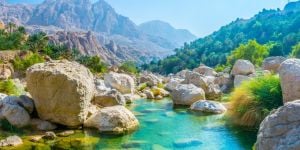Hello Dears,
here is some tips i got it from internet i think it will be very useful for the summer time coz we are going to have very hot weather during summer time in Oman...some info it may need you to know about it,
let's start...
Characteristics of people who tend to be most sensitive to heat:
☼ Very small body size.
☼ Poor nutrition
☼ Overweight
☼ Over 40 years old (the older, the more sensitive)
☼ Previous heat illness
☼ Heart disease
☼ High blood pressure
☼ Diabetes
☼ Skin disease
☼ Liver, kidney, and lung problems.
There are three stages of heat-related illness: heat cramps, heat exhaustion
and heat stroke. Heat cramps are the least serious of the three and usually
occur during or after intense physical exercise. Drinking lots of water can usually
prevent them. Heat exhaustion is the most common, and symptoms of include
weak, rapid pulse; low blood pressure; headache; nausea; dizziness; goose
bumps and weakness. If you have these symptoms, you should stop exercising
or working, move to a cooler area and begin drinking fluids.
Fluid needs
Every day you lose water through your breath, perspiration, urine and bowel
movements. You must replace those losses every day for your body to be
healthy and work properly.
The Institute of Medicine recommends these amounts of total fluid daily:
Women
51 70 years 11 ½ cups
70 and above 9 cups
Men
51 70 years 15 ½ cups
70 and above 11 cups
Tips for Getting Enough Fluids
☼ Keep a glass or bottle of water with you during the day so you can sip from
it often. When you travel, bring your water bottle along. But remember, if
you drink from a bottle, thoroughly clean or replace the bottle often.
☼ Drink cool water because its absorbed faster, and youll usually drink more
because it tastes better.
☼ Start some of your meals with soup. Soup provides plenty of fluid and
can curb your appetite if you're trying to lose weight. Be careful of the sodium
levels in canned soups though! If you are on a low-salt diet, choose soups
that are lower in sodium.
☼ Drink more water, milk and juices and fewer soft drinks. When working or
exercising strenuously, a sports drink may be useful for replacing lost
electrolytes and providing carbohydrates for energy. But because they add
calories, they are not recommended as a major part of daily fluid intake.
☼ Drink when you feel thirsty and even when you don't feel thirsty! When
exercising or doing other hard physical labor, drink water every 15-20
minutes, even if you're not thirsty.
☼ Increase your fluid intake if your diet is high in fiber, protein or salt.
☼ Some beverages, especially those containing alcohol, may lead to a loss
of body water.
follow...
















